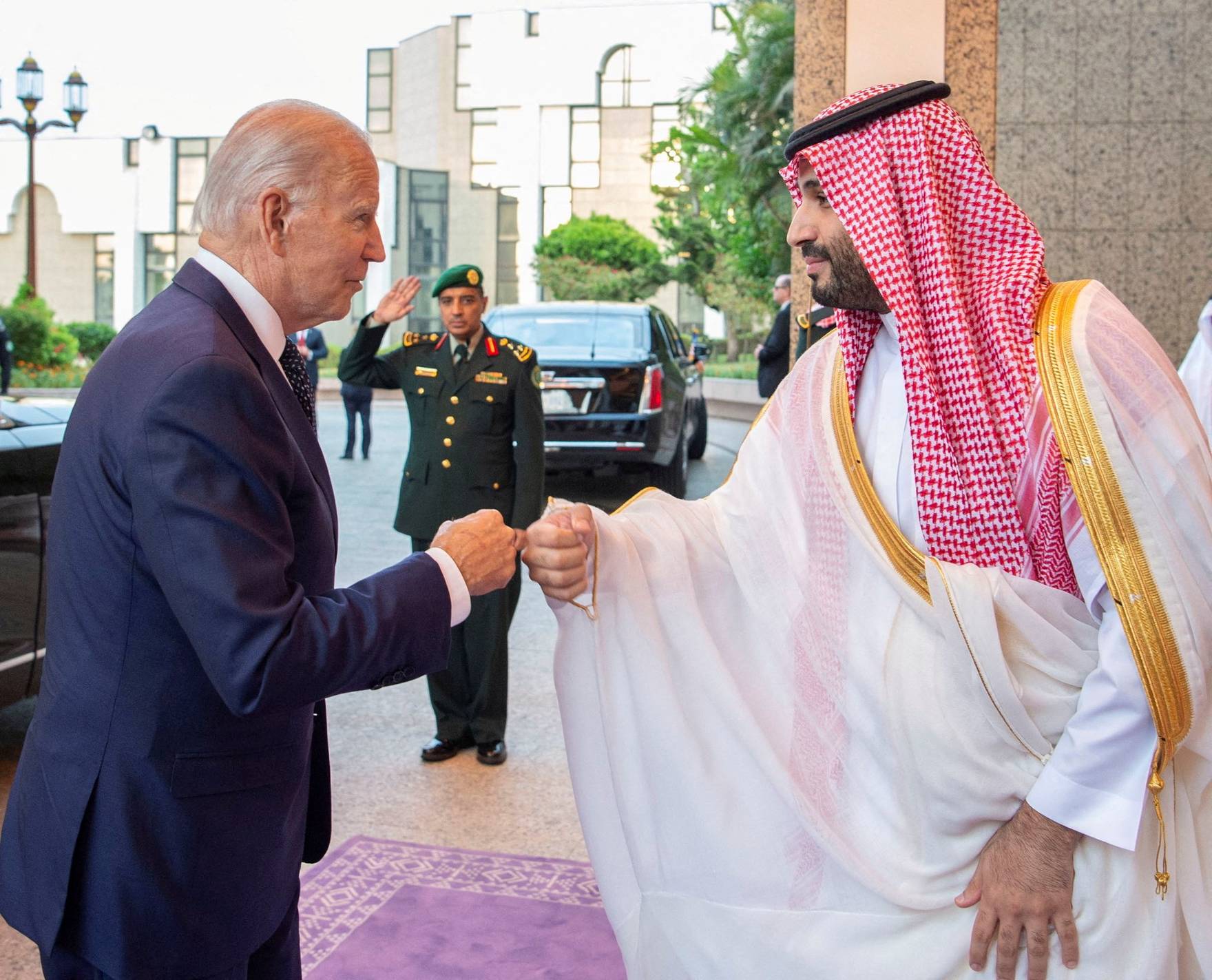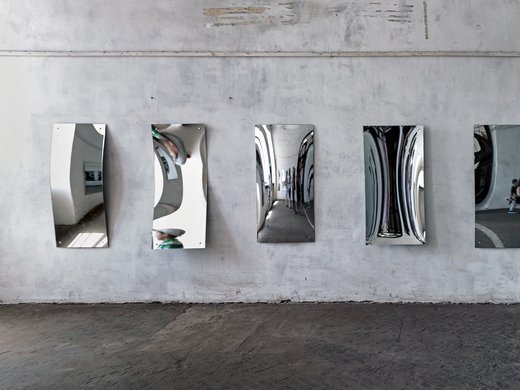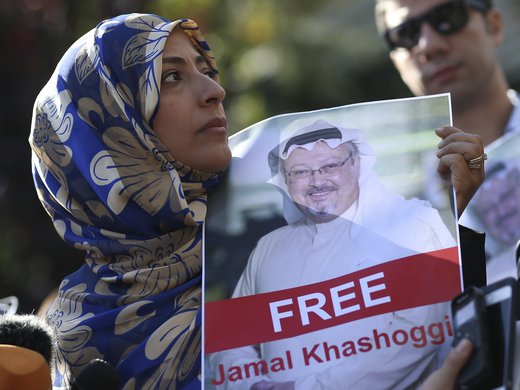President Joe Biden’s visit to Saudi Arabia was never going to be easy. But when the world saw the fist bump between the US president and Saudi Crown Prince Mohammed bin Salman last month, a furor ensued. Ever since he was credibly accused by US intelligence services of ordering the murder of journalist Jamal Khashoggi in 2018, Mohammed bin Salman, or MBS, as he is better known, has been an undesirable in democratic circles.
Responses to the bilateral meeting were typically fierce, including at The Washington Post, which Khashoggi wrote for. For Fred Ryan, the Post’s publisher and CEO, “the fist bump between President Biden and Mohammed bin Salman was worse than a handshake — it was shameful.” Hatice Cengiz, who was engaged to Khashoggi, tweeted to President Biden in the voice of her late partner: “Is this the accountability you promised for my murder? The blood of MBS’s next victim is on your hands.” One can only imagine the reactions in Canada of Omar Abdulaziz, a close associate of Khashoggi exiled in Canada, and Ensaf Haidar, whose activist husband Raif Badawi was imprisoned for years.
The criticism of Biden on this score is understandable. The brutal murder of Jamal Khashoggi caused shock waves around the world and rocked geopolitical alliances. Following on a long list of atrocities and human rights violations, including a war in Yemen that has killed thousands of civilians, Khashoggi’s assassination was the last straw. In 2020, then presidential candidate Biden promised to make Saudi Arabia a pariah state, to ensure that MBS would “pay the price.” After disastrous wars in Iraq and Afghanistan, the United States also sought to turn away from the Middle East.
But then came the war in Ukraine and the ensuing surge in oil and gas prices. Geopolitics trumped concerns about Saudi Arabia’s human rights record, as Biden sought to introduce a foreign policy that serves the economic interests of the American middle class.
In today’s fraught geopolitical climate, pragmatism often takes precedence over human rights. But that shouldn’t deter us from shining light on digital rights violations committed by our Middle Eastern partners, including the Kingdom of Saudi Arabia and the United Arab Emirates (UAE). Both countries are socially ultra-conservative, and their royal families and leaders have made modern technologies a tool of global repression and influence.
Self-image Obsession: Whitewashing Human Rights Violations
Both countries are determined to present a positive image on the global stage. Looking at the Freedom on the Net reports from Washington, DC–based Freedom House, the state censorship and lack of freedom of expression in Saudi Arabia and in the UAE are replicated on their internets. Authorities prevent access to websites belonging to human rights organizations, filter messages on social media platforms, and compel platforms to remove content deemed harmful or offensive to the royal families, the state and even allies in the Persian Gulf. Threats of imprisonment have led many journalists and activists to practise self-censorship, according to Freedom House’s reports. For New York Times journalist Ben Hubbard, the internet in Saudi Arabia “becomes a very sort of scary place for people, where people are getting in trouble for things that they wrote on Twitter or things that they maybe said in a gathering that they thought was private.”
Like many millennial leaders, such as El Salvador’s Nayib Bukele, MBS cares about his own, and his country’s, online image. He is an authoritarian who understands the power of visuals and values direct personal engagement, especially with American presidents. MBS has sought to transform the kingdom by enacting social and economic changes, investing in the tourism sector, taking away powers from the religious police, and allowing women to drive.
In March 2018, the Crown Prince posed with Hollywood and Silicon Valley executives in an attempt to reinvent his and his country’s reputation. Under his Vision 2030 plan, international athletes such as golfers have hosted tournaments and celebrities have taken government money to come to Saudi Arabia and take part in “the kingdom’s strategy of whitewashing Crown Prince Mohammad bin Salman’s abuses,” says Human Rights Watch.
Early on, MBS understood the transformative power of social media, including the risks to his regime as social critics began to flood the internet. But how to balance silencing criticism and boosting his image at the same time? One tactic, according to Access Now, involves using social media influencers and “electronic armies,” tech and social media experts who “assume false identities in order to participate in internet forums and social media to send — or suppress — a specific message.”
Indeed, as scholar Kristin Smith Diwan writes, the Mohammed bin Salman Foundation has “cultivated relationships with social media influencers, recruiting them as advocates for the new regime.” Australian influencers Gab Scanu and Tara Whiteman have been invited to Saudi Arabia on all-expenses-paid trips, presumably in exchange for presenting an idealized image of the country. To silence certain narratives, electronic armies have proved useful. In March 2021, a coordinated campaign on Twitter used fake profiles and hashtags to shape the narrative around Khashoggi’s killing.
In the UAE, social media commentators are regularly jailed for criticizing UAE authorities and policies. The UAE’s 2012 cybercrime law imposes lengthy prison terms on anyone who uses information technology “with the intent of deriding or harming the reputation, stature, or status of the state, any of its institutions, its president or vice president, the rulers of the emirates, their crown princes or their deputies, the state flag, national safety, its motto, its national anthem, or its symbols.”
Emirati authorities have made widespread use of this vague law. In 2018, human rights activist Ahmed Mansoor received a 10-year prison sentence for using social media “to publish false information that damages the country’s reputation” and to “spread hatred and sectarianism.” Other cases include that of academic Dr. Nasser bin Ghaith, jailed in the UAE for “posting false information in order to harm the reputation and stature of the State and one of its institutions”; Jordanian journalist Tayseer al-Najjar, who was sentenced to three years in prison for “insulting state symbols” on Facebook; and Ahmed Etoum, a Jordanian living in the UAE, who was sentenced to 10 years’ imprisonment for criticizing Jordan’s royal family on Facebook, deemed a violation of UAE Federal Decree — Law No. 5 of 2012 on Combatting Cybercrimes.
Local social media influencers are required to register with the government every year and pay a fee equivalent to about CDN$4,500. While the registration could be seen as an attempt to regulate a lucrative industry, it also means that the government can control who is posting what.
While MBS pretends to have granted more rights to women, including the right to drive, the reality is more complicated.
Transnational Repression: Where Social Media Can Be Deadly
Spyware, electronic armies, proxy punishment and other digital tactics have now become part of the toolbox of transnational repression. Technology allows autocratic and illiberal regimes to threaten and surveil critics beyond their borders, extending authoritarianism to the online world. Unsurprisingly, both Saudi Arabia and the UAE have made use of NSO Group’s Pegasus spyware to infiltrate the devices of journalists, activists and non-governmental organizations.
According to Freedom House’s 2022 report Defending Democracy in Exile, Saudi Arabia is among the most aggressive regimes in terms of transnational repression. MBS’s rise to power tracks closely with repression of human rights activists, journalists and former officials, and insiders such as former intelligence officer Saad Aljabri and Prince Sultan bin Turki II. Indeed, Saudi Arabia’s electronic army not only spreads positive messages about the kingdom but also threatens critics abroad. According to The New York Times, the directors of a troll farm based in the capital, Riyadh, “turn to their well-organized army of ‘social media specialists’ via group chats in apps such as WhatsApp and Telegram, sending them lists of people to threaten, insult and intimidate; daily tweet quotas to fill; and pro-government messages to augment.”
The New York Times reports that the director of this operation, consultant and former royal court adviser Saud al-Qahtani, once held a blacklist of so-called enemies of the kingdom and tweeted, “Add every name you think should be added to #The_Black_List using the hashtag. We will filter them and track them starting now.”
In an unprecedented move, the Saudi government even hired two Twitter employees based in the United States to assist in the surveillance of political dissidents. In a court filing, the US Justice Department says that between 2013 and 2015, Ahmad Abouamma and Ali Alzabarah used their access to data to gather information about users, whose phone numbers and Internet Protocol addresses “could have been used by the Saudi government to identify and locate” dissidents. While Alzabarah managed to flee prosecution, Abouamma has just been found guilty of acting as an unregistered agent of the Saudi government.
Saudi Arabia uses technology to target not only Saudi critics, but also staff at Amnesty International, The New York Times and the Guardian. There’s also a Canadian angle: in 2018, the Toronto-based think tank Citizen Lab revealed that the phone of Montreal resident and Saudi dissident Omar Abdulaziz had been infected with NSO’s Pegasus spyware and linked the breach to Saudi Arabia. Abdulaziz, who was close to Khashoggi, believes that conversations between the two “played a major role in what happened to Jamal.”
In 2016, a UAE-based cybersecurity firm called DarkMatter hired hackers, including former US intelligence and military operatives, to engage in cybersurveillance of other governments, human rights activists, journalists and critics of the regime. Known as Project Raven, the espionage campaign targeted individuals in the Emirates and abroad, including British journalist Rori Donaghy and prominent Emirati activist Ahmed Mansoor. Mansoor had criticized the UAE’s role in the war in Yemen, its treatment of migrant workers and detention of political opponents. Like their Saudi neighbour, the Emirates have made ample use of NSO’s Pegasus spyware, including against a British academic, and UK-based Emirati activist Alaa al-Siddiq, who died in a car accident in London in 2021.
Gender-Based Online Repression
In Saudi Arabia and the UAE, digital repression has a uniquely gendered aspect. Considering the kingdom, Freedom House states that “severe gender-based repression in Saudi Arabia results in women featuring more prominently in the country’s transnational repression campaign than in other cases.” The same could be said about the Emirates, where gender-based repression and the male guardianship system — under which male relatives have authority to make critical decisions on women’s behalf — are just as severe.
While MBS pretends to have granted more rights to women, including the right to drive, the reality is more complicated. For example, Saudi women have been discouraged from posting photos on social media, according to Freedom on the Net, and from taking part in online activism. Saudi Arabia outlawed sexual harassment in 2018. But when hundreds of women shared their experience of sexual harassment on social media in 2020, they were met with a barrage of threats and smears. In January 2022, after Saudi women took to social media to report sexual harassment, Saudi authorities denied the claims and warned that “spreading rumors” on social media could lead to fines and prison sentences.
While MBS is proud to claim that he has liberalized Saudi Arabia, several women who led social media campaigns demanding the right to drive and the end of guardianship were later arrested. Loujain al-Hathloul, one of the leaders of the Saudi women’s rights movement, was charged in 2018 with “undermining the kingdom and its political system.” Sentenced to five years in prison in 2020, she has since been released but is banned from leaving Saudi Arabia.
According to The New York Times’ Hubbard, MBS “didn’t want these women who had been campaigning to be taking victory laps on social media or to be interviewed by the press, talking about all the work that they had done to put this on the agenda.”
One of the worst technological symbols of Saudi women’s lack of agency is the kingdom’s state-run Absher online platform and mobile app, which allows users to access government services such as applying for identification cards and visas. The app has also been used by male “guardians” to grant or deny permission for women and children to travel abroad. While the app does not track women in real time, it allows men to prevent women from travelling freely, thereby also preventing them from obtaining jobs that would require travel abroad.
Gender-based repression led the number of Saudi asylum seekers to more than double since MBS’s appointment as crown prince. Over the past few years, there have been several cases of women desperately trying to flee the country to escape social and legal constraints or abuse within their families.
Here again, social media is a double-edged sword, as women have learned to use social media and private chat groups to plan their escape and to reach out during the process. When Rahaf Mohammed al-Qunun was stopped in Thailand while trying to flee to Australia, she used social media to draw attention to her arrest, leading to an international #SafeRahaf social media campaign that eventually led the United Nations High Commissioner for Refugees to grant her refugee status. Al-Qunun now resides in Canada.
Another young woman named Nourah used her father’s phone to gain access to the Absher platform and grant herself the right to travel abroad.
However, others have not been so fortunate. In 2017, a fleeing Saudi woman named Dina Ali Lasloom was stopped in the Philippines and used a phone to film videos calling for help, saying that her family would kill her. She was held at the airport until reportedly two uncles picked her up. Where she is now is unknown.
In the short term, President Biden seems to have gained relatively little from his trip to Saudi Arabia.
The Rehabilitation of MBS
Making Saudi Arabia a pariah state was never going to be feasible. Saudi Arabia remains the second-largest oil-producing country and a key player in security in the Middle East. In his remarks on his meetings in Saudi Arabia, Biden promised the United States was “not going to leave a vacuum in the Middle East for Russia or China to fill.” As former US deputy assistant secretary of defense for Middle East policy Andrew Exum wrote in The Atlantic: “Biden, for his part, is sacrificing his values today in the interests of something we haven’t seen much of in the past two decades: realism.”
In the short term, however, President Biden seems to have gained relatively little from his trip to Saudi Arabia: a cyber agreement and partnerships that would potentially give the United States an advantage in blocking Beijing’s 5G (fifth-generation mobile) networks. There will also be further normalization of relationships between Israel and the Gulf States. MBS, however, gained a great deal from the meeting. It has given him the green light to re-enter diplomatic circles, as his recent meeting with French President Emmanuel Macron indicates. There will always be voices arguing that realpolitik and geopolitical interest should win out over rights. But as Agnès Callamard, the secretary general of Amnesty International, has said, Prince Mohammed’s visit to France and Biden’s trip to Saudi Arabia “do not change the fact that [Prince Mohammed] is [not] anything other than a killer.” Personally, the fist bump reminded me of the words of Lieutenant-General Roméo Dallaire when he met with the Hutu elite who’d organized the Rwandan genocide: “I shook the hand of the devil.” MBS’s return to polite diplomatic circles raises another question: Will Russia’s Vladimir Putin one day be rehabilitated as well? If defending Ukraine from Russian autocracy is also a fight for liberal values, the West’s renewed relationship with MBS brings cold realism and little comfort.



